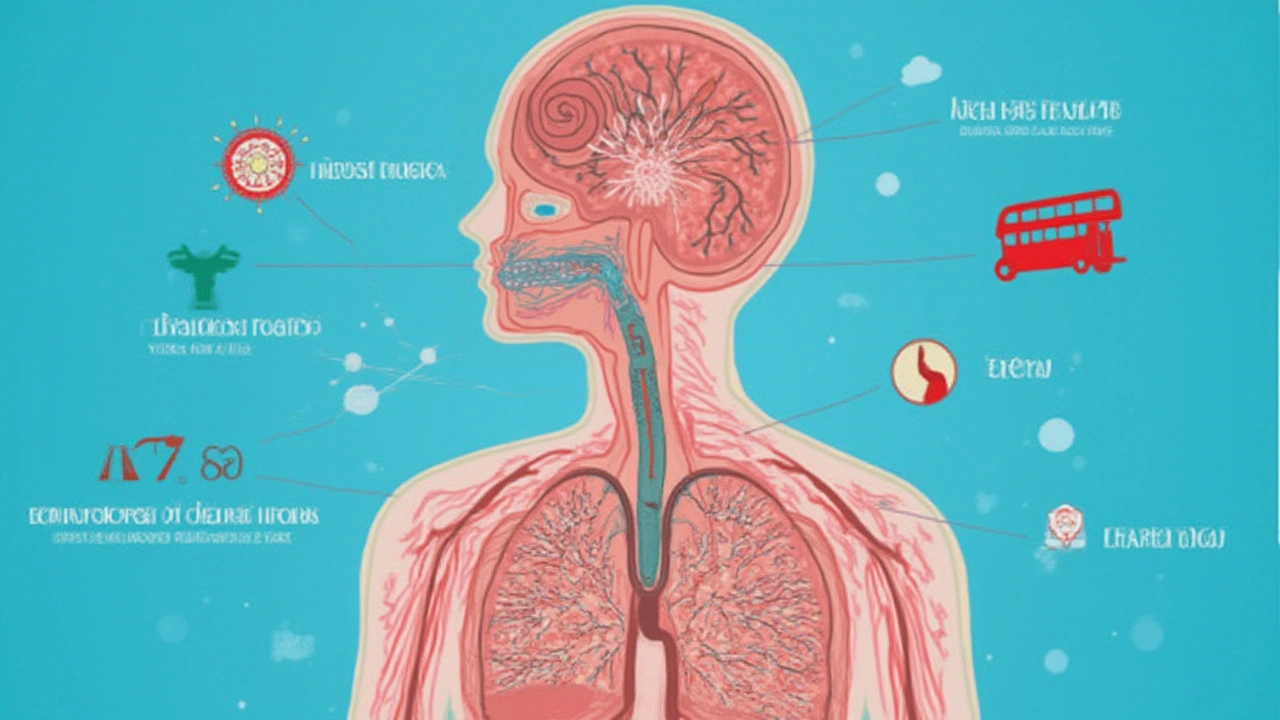
Picture this—you're not running a fever, you haven't had the chills, there's no sore throat, but for weeks now, you've been hacking up gunk. It shows up in your throat, sticky and annoying. No amount of hot tea or sugar-free cough drops seems to shut it up. Sound familiar? You're definitely not the only one. Having a mucus cough with no obvious cold is weirdly common, and it can drive you nuts (and seriously annoy everyone sharing your space).
What Causes a Mucus Cough When You’re Not Actually Sick?
First things first—let's get real about what mucus is doing hanging out in your throat. Your body regularly makes a surprising amount of the stuff. On an average day, you’re cranking out between 1 and 1.5 liters of mucus. Most of the time, you never even notice; it slides down your throat and disappears. But when you feel it piling up and you keep coughing it out, something’s up, even if you feel fine otherwise.
So what gives? Turns out, “not sick” is way more complicated than it sounds. A bunch of common things can trigger a mucus cough that sticks around, even when you aren’t laid out with the flu or stuffed up from a cold. Here are the top culprits:
- Allergies: Think pollen, pet dander, dust mites—anything your immune system doesn’t like can set off a mucus party in your throat. You don’t have to be sneezing your brains out to still get mucus buildup.
- Postnasal drip: Sinuses drain mucus down the back of your throat. You might not even notice a drippy nose, but your cough tells the story.
- Acid reflux (GERD): If you ever get heartburn or sour taste in your mouth, stomach acid might be irritating your throat lining, turning on the mucus taps.
- Environmental irritants: Cigarette smoke, car exhaust, perfume, and even household cleaning products can irritate your airways and trigger your body to make extra mucus.
- Asthma: Even mild or hidden asthma can show up as nothing but a chronic cough with or without extra phlegm.
- Medications: Weirdly, some meds for blood pressure (like ACE inhibitors) can make you cough, even if you feel perfectly healthy otherwise.
- Dehydration: Not drinking enough water thickens mucus, making it stickier and harder to clear from your throat.
- Habit: For some people, clearing your throat just becomes a reflex (think of it like your body's nervous tic), making you notice and make more mucus.
Let’s talk about the type of mucus: clear, white, yellow, or green. Old school wisdom says green means infection, but more often, color is just a sign of concentrated dead cells and dried-out mucus. If you aren’t feeling sick, color alone doesn’t mean you need antibiotics. Research in the British Medical Journal found that color and thickness by themselves don’t predict a bacterial infection. Another fun fact: those “chesty cough” syrups barely move the needle for chronic mucus cough that isn’t caused by an infection.
| Trigger | Common Symptoms | Typical Relief |
|---|---|---|
| Allergies | Itchy eyes/nose, sneezing, clear mucus | Antihistamines, avoid triggers |
| GERD | Heartburn, sour taste, thick phlegm | Avoid triggers, acid reducers |
| Postnasal Drip | Tickle in throat, clearing often, sticky mucus | Saline spray, hydrate, humidifier |
| Environmental Irritants | Scratchy throat, cough, clear/yellow mucus | Ventilate, avoid exposure |
| Asthma | Occasional wheeze, tight chest, persistent cough | Inhalers, asthma management |
One thing to look out for—if you cough up blood, have unexplained weight loss, night sweats, or feel super tired for weeks, check with your doctor. These aren’t your run-of-the-mill “I ate too much dairy” symptoms. Same if you’re constantly short of breath or wheeze often, especially if you have a history of smoking. Don’t try to DIY those issues—get a pro involved.

What You Can Do About a Persistent Mucus Cough
Okay, you know the likely suspects. But how do you deal with that annoying cough and gunky feeling? Spoiler: you’re probably not doomed to a life of throat clearing.
Start with your daily habits. Simple changes can really make a dent:
- Stay hydrated: Water is your friend. Drinking enough thins out mucus, making it less sticky and easier to cough up or swallow. Set reminders if you have to.
- Humidify your air: Dry air, especially from heating or AC, thickens mucus. A bedside humidifier can stop the “sticky throat” in the mornings.
- Avoid triggers: If you know pollen or pet dander sets you off, try an antihistamine, or at least rinse your nose with saline after being outside or petting your cat.
- Watch what you eat and drink: Big greasy meals or lots of caffeine can make GERD worse, creating more mucus. Cutting back can quiet things down. Good idea to keep a food diary if you're not sure what's messing with you.
- Review your meds: If you just started a new prescription (like an ACE inhibitor) and the cough began soon after, talk to your doc about options.
- Avoid smoking or smoky places: Cigarette smoke is a major trigger for mucus production, even for non-smokers exposed to secondhand fumes.
- Try nasal irrigation: Squirting saline into your nose flushes out allergens and thins mucus. It’s weird at first, but lots of people swear by it.
If you wake up feeling like your throat is a sticky mess, you’re not alone. It’s actually more common to have postnasal drip at night, since lying down lets mucus collect more easily. Propping up your head with an extra pillow can help gravity do its thing. If you keep missing good sleep over your cough, ask a pharmacist about safe over-the-counter options—or see a doctor if it drags on.
People love to blame “too much dairy” for mucus, but science says dairy doesn’t make your body actually produce more. It can just feel thicker after a glass of milk—but it won’t cause a chronic mucus cough on its own.
Don’t ignore your allergies. Even if you had them mostly as a kid, adult allergies sneak up and stick around. Research from the American College of Allergy, Asthma, and Immunology found that over 30% of adults develop nasal allergies after age 30, often with little warning, so don’t rule it out based on your past.
Quick test: If you feel better when you travel to a new city (maybe visiting your cousins in rainy Seattle or dry Arizona), that’s a big hint your home environment is making things worse.
Sometimes, all you really need is time. After a virus, a mucus cough can hang around for up to eight weeks, even after you “feel fine.” This is called post-infectious cough. If you don’t feel sick otherwise and aren’t getting worse, give it a few weeks. Patience pays off.
But if you ever get curious, keep a “cough journal.” Note when you cough, what the mucus looks like, and what you were doing right before. Sounds nerdy, but it helps you catch hidden patterns—like “always worse after mowing the lawn” or “starts up with the heat on.” Medical pros love this info if you decide to get checked out.

When to Get Help (and What Your Doctor Might Actually Do)
Let’s cut to the chase: At what point should you stop Googling and call the doc? Here are some solid reasons to book an appointment:
- Your cough lasts more than 8 weeks or is getting worse.
- You’re coughing up blood, even a little bit.
- Chest pain, wheezing, or shortness of breath with the cough.
- Other red flags: fevers, weight loss, or night sweats.
- You have a history of lung disease, smoking, or immune system problems.
Doctors don’t just toss antibiotics at every cough, especially if it’s just mucus and no infection signs. They dig for the underlying cause. They’ll probably ask about your home, work, allergy history, and any other symptoms. If things aren’t clear, you might get a simple chest X-ray or allergy testing. For stubborn cases, they might check lung function with a spirometer (breathe in, blow hard—easy as that). Sometimes, a trial run with asthma or reflux meds helps nail down the culprit without fancy tests.
If it’s allergies, allergy meds or nasal sprays make a world of difference. Reflux? Doctors might suggest dietary tweaks and acid-lowering pills. Asthma? Inhalers work wonders once you’re shown how to use them right. Stubborn, unexplained mucus coughs might get referred to an ENT or a lung specialist if nothing else fits.
One cool advance—telehealth has exploded since 2020. You can often get allergy or cough advice over a video call, sometimes even same day. That saves sitting in a stuffy waiting room while you try (and fail) not to cough in public.
For people over 50 or with a history of smoking, doctors may be more aggressive with chest scans to rule out anything serious. It’s rare, but better safe than sorry, especially if you’re in that higher-risk group. For the average healthy adult with a nagging mucus cough and no “red flag” symptoms, reassurance and a little patience goes a long way.
Here’s what you can do right now:
- Run a humidifier at night, especially if you blast the AC or heater.
- Stay hydrated—your throat can’t flush out mucus if you’re dried out.
- Try a sinus rinse if you think it’s postnasal drip.
- Keep a cough log if you’re seeing a doctor soon—it’ll help them help you.
- Don’t stop moving—gentle exercise can actually help you clear mucus more effectively.
So, having a mucus cough while “not sick” is a lot more common than people let on. Bodies are weird, and they react to all sorts of stuff in the environment, especially as we get older or change up our diets and daily routines. Most of the time, it’s triggered by things that aren’t obvious right away. A few small changes and some detective work can usually get you back to clear throats and fewer awkward public coughs. If you’re worried, don’t wait—get it checked and get on with life. The world has enough mysteries. Your cough doesn’t have to be one of them.